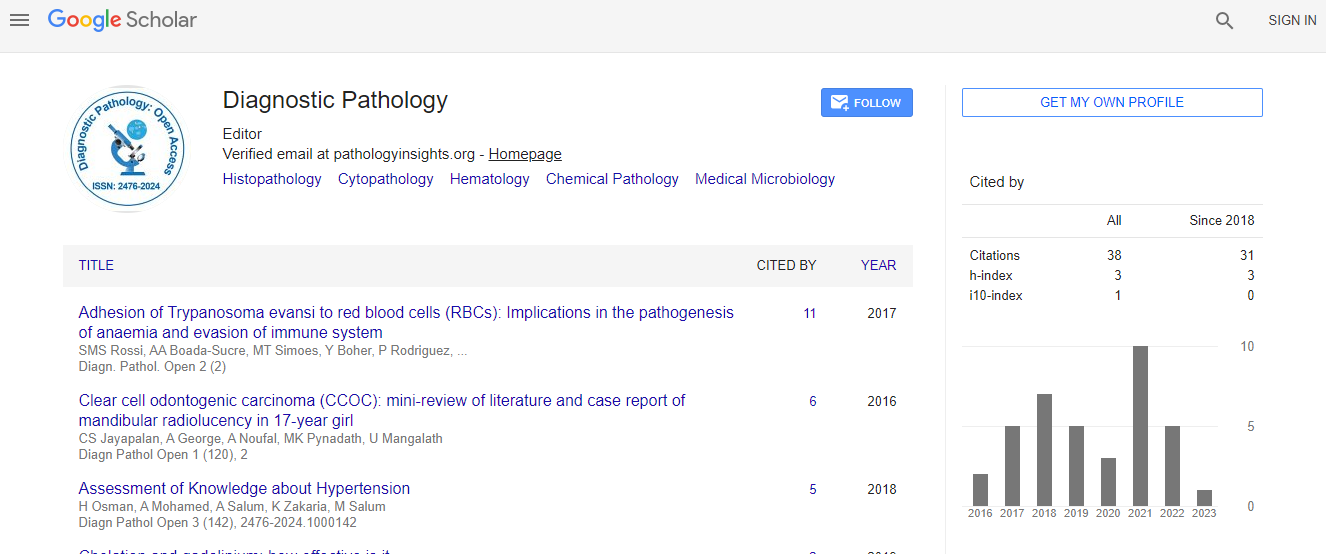Our Group organises 3000+ Global Conferenceseries Events every year across USA, Europe & Asia with support from 1000 more scientific Societies and Publishes 700+ Open Access Journals which contains over 50000 eminent personalities, reputed scientists as editorial board members.
Open Access Journals gaining more Readers and Citations
700 Journals and 15,000,000 Readers Each Journal is getting 25,000+ Readers
Google Scholar citation report
Citations : 110
Diagnostic Pathology: Open Access received 110 citations as per Google Scholar report
Diagnostic Pathology: Open Access peer review process verified at publons
Indexed In
- Google Scholar
- RefSeek
- Hamdard University
- EBSCO A-Z
- Publons
- Euro Pub
- ICMJE
Useful Links
Share This Page
IgG4 deficiency with gene deletion in down syndrome
13th International Conference on Laboratory Medicine & Pathology
Jeraiby M , Lambert C and Toyraine R
Department of Medical Biochemistry, Faculty of Medicine, Jazan University, Saudi Arabia
Posters & Accepted Abstracts: Diagn Pathol Open
Abstract
Background & Aim: IgG4 deficiency is more frequent among persons with Down syndrome (DS), without identifying explanation. The role of IgG4 deficiency which is not fully established for many affected persons in the general population are asymptomatic. Nevertheless, in the context of DS it may be an important factor in repeated infections and even stroke. The aim of the present study was to investigate the molecular mechanism of IgG4 deficiency at the level of the heavy chain gene (IGHG4) gene. Methodology: Quantitative real-time polymerase chain reaction (Q-PCR) was carried out to measure IGHG4 copies number with SYBR Green detection and comparison to a reference gene (36B4). A IGHG4/36B4 ratio was considered normal (2 copies of IGHG4) when between 0.8 and 1.2. We studied 44 DS persons: 21 males and 23 females from 7 years to 57 years, composed of 23 DS persons (11 males and 12 females) carrying severe IgG4 deficiency (<0.02 g /L), 5 having an IgG4 level not detectable and 21 DS subjects (10 males and 11 females) with no IgG4 deficiency (level >0.1 g /L). The patient group was compared with 38 healthy donors (controls) without DS. Results: IGHG4 heterozygous deletion was found in 16 (69.6%) DS patients with IgG4 deficiency versus in 2 (9.5%) DS subjects without IgG4 deficiency (p=0.0001 with Yates correction) in the control group, no deletion was seen. Conclusions: IGHG4 haploinsufficiency is highly correlated to IgG4 deficiency in our population with DS, but other factors exist that needs to be identified.Biography
Jeraiby M has completed his Residency Program in Medical Biology (MD) at Saint-Étienne University Hospital Center, France. He is currently an Assistant Professor in Medical Biochemistry, Faculty of Medicine, Jazan University, Kingdom of Saudi Arabia. He has published more than 7 papers in international journals and has been serving as a Reviewer in clinical case report journal.
E-mail: mojer2011@hotmail.com

 Spanish
Spanish  Chinese
Chinese  Russian
Russian  German
German  French
French  Japanese
Japanese  Portuguese
Portuguese  Hindi
Hindi 
